- Browse
- Linear Regression
Results for "linear regression"
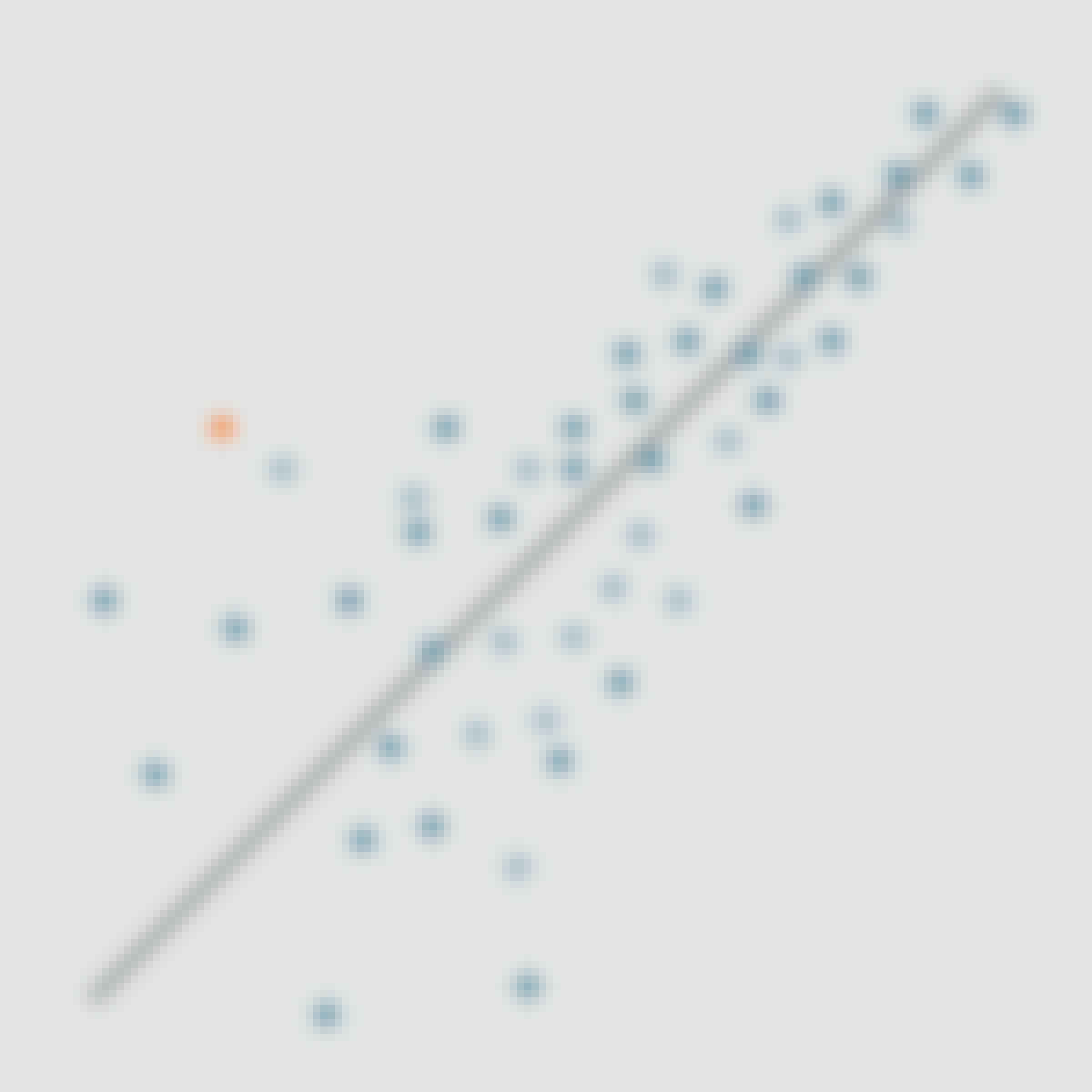 Status: Free TrialFree TrialD
Status: Free TrialFree TrialDDuke University
Skills you'll gain: Regression Analysis, R (Software), Data Analysis Software, Statistical Analysis, R Programming, Statistical Modeling, Statistical Inference, Correlation Analysis, Model Evaluation, Exploratory Data Analysis, Mathematical Modeling, Statistics, Predictive Modeling, Probability & Statistics
4.8·Rating, 4.8 out of 5 stars1.8K reviewsBeginner · Course · 1 - 4 Weeks
 Status: Free TrialFree TrialI
Status: Free TrialFree TrialIIllinois Tech
Skills you'll gain: Statistical Inference, Regression Analysis, R Programming, Statistical Analysis, Statistical Modeling, R (Software), Data Science, Logistic Regression, Data Analysis, Probability & Statistics, Linear Algebra
Build toward a degree
4.6·Rating, 4.6 out of 5 stars30 reviewsIntermediate · Course · 1 - 4 Weeks
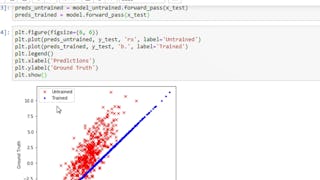 C
CCoursera
Skills you'll gain: Regression Analysis, NumPy, Supervised Learning, Machine Learning Algorithms, Machine Learning, Predictive Modeling, Deep Learning, Data Science, Python Programming
4.6·Rating, 4.6 out of 5 stars438 reviewsIntermediate · Guided Project · Less Than 2 Hours
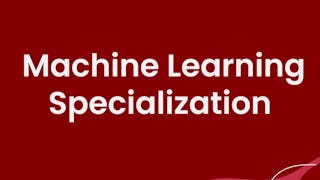 Status: Free TrialFree TrialDS
Status: Free TrialFree TrialDSMultiple educators
Skills you'll gain: Unsupervised Learning, Supervised Learning, Transfer Learning, Machine Learning, Jupyter, Applied Machine Learning, Data Ethics, Decision Tree Learning, Model Evaluation, Tensorflow, Scikit Learn (Machine Learning Library), NumPy, Predictive Modeling, Deep Learning, Artificial Intelligence, Classification Algorithms, Reinforcement Learning, Random Forest Algorithm, Feature Engineering, Data Preprocessing
4.9·Rating, 4.9 out of 5 stars38K reviewsBeginner · Specialization · 1 - 3 Months
 Status: Free TrialFree TrialI
Status: Free TrialFree TrialIImperial College London
Skills you'll gain: Correlation Analysis, Regression Analysis, Data Analysis, R Programming, Descriptive Statistics, Statistical Modeling, R (Software), Exploratory Data Analysis, Model Evaluation, Statistical Analysis, Probability & Statistics, Biostatistics, Data Import/Export
4.8·Rating, 4.8 out of 5 stars528 reviewsIntermediate · Course · 1 - 4 Weeks
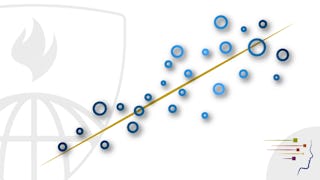 Status: Free TrialFree TrialJ
Status: Free TrialFree TrialJJohns Hopkins University
Skills you'll gain: Regression Analysis, Statistical Analysis, Statistical Modeling, Logistic Regression, Data Analysis, Model Evaluation, Probability & Statistics, Statistical Inference
4.4·Rating, 4.4 out of 5 stars3.4K reviewsMixed · Course · 1 - 4 Weeks
What brings you to Coursera today?

Skills you'll gain: Regression Analysis, Visualization (Computer Graphics), Scikit Learn (Machine Learning Library), Feature Engineering, Data Cleansing, Predictive Modeling, Data Analysis, Statistical Modeling, Supervised Learning, Machine Learning, Python Programming
4.6·Rating, 4.6 out of 5 stars67 reviewsBeginner · Guided Project · Less Than 2 Hours
 Status: NewNewStatus: PreviewPreviewS
Status: NewNewStatus: PreviewPreviewSSimplilearn
Skills you'll gain: Predictive Analytics, Regression Analysis, Predictive Modeling, Machine Learning, Supervised Learning, Forecasting, Case Studies, Business Analytics, Statistical Modeling
Beginner · Course · 1 - 4 Weeks
 Status: Free TrialFree TrialR
Status: Free TrialFree TrialRRice University
Skills you'll gain: Statistical Hypothesis Testing, Statistical Methods, Regression Analysis, Statistical Analysis, Statistical Modeling, Statistical Inference, Business Analytics, Microsoft Excel, Model Evaluation, Estimation, Data Analysis
4.8·Rating, 4.8 out of 5 stars1.4K reviewsMixed · Course · 1 - 4 Weeks
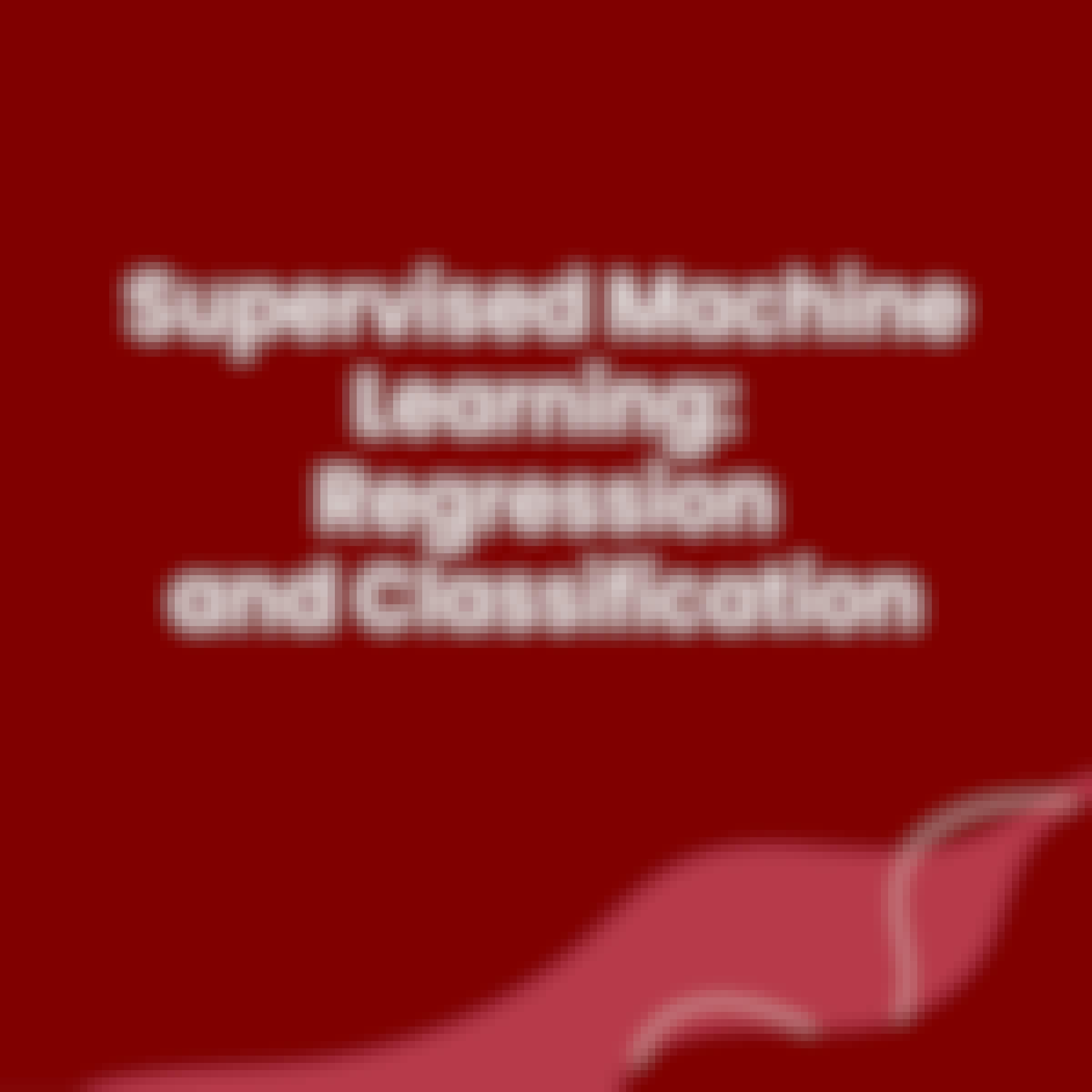 Status: Free TrialFree TrialD
Status: Free TrialFree TrialDDeepLearning.AI
Skills you'll gain: Supervised Learning, Jupyter, Scikit Learn (Machine Learning Library), Machine Learning, NumPy, Predictive Modeling, Classification Algorithms, Feature Engineering, Artificial Intelligence, Model Evaluation, Data Preprocessing, Python Programming, Logistic Regression, Regression Analysis, Unsupervised Learning
4.9·Rating, 4.9 out of 5 stars32K reviewsBeginner · Course · 1 - 4 Weeks
 Status: Free TrialFree TrialJ
Status: Free TrialFree TrialJJohns Hopkins University
Skills you'll gain: Linear Algebra, Algebra, Applied Mathematics, Advanced Mathematics, Artificial Intelligence and Machine Learning (AI/ML), Mathematical Modeling, Engineering Analysis, Mathematical Theory & Analysis, Numerical Analysis, Geometry, Data Transformation, Applied Machine Learning, Dimensionality Reduction, Markov Model, Probability
4.7·Rating, 4.7 out of 5 stars222 reviewsBeginner · Specialization · 3 - 6 Months
 Status: Free TrialFree Trial
Status: Free TrialFree TrialSkills you'll gain: Regression Analysis, Statistical Hypothesis Testing, Logistic Regression, Model Evaluation, Statistical Modeling, Predictive Modeling, Statistical Analysis, Advanced Analytics, Data Analysis, Correlation Analysis, Predictive Analytics, Machine Learning, Variance Analysis, Python Programming
4.7·Rating, 4.7 out of 5 stars586 reviewsAdvanced · Course · 1 - 3 Months
Searches related to linear regression
In summary, here are 10 of our most popular linear regression courses
- Linear Regression and Modeling : Duke University
- Linear Regression: Illinois Tech
- Linear Regression with Python: Coursera
- Machine Learning: DeepLearning.AI
- Linear Regression in R for Public Health : Imperial College London
- Regression Models: Johns Hopkins University
- Simple Linear Regression for the Absolute Beginner: Coursera
- Introduction to Linear Regression Training : Simplilearn
- Linear Regression for Business Statistics: Rice University
- Supervised Machine Learning: Regression and Classification : DeepLearning.AI
Frequently Asked Questions about Linear Regression
Linear regression is a statistical method used to model the relationship between a dependent variable and one or more independent variables. It is important because it provides a simple yet powerful way to predict outcomes and understand relationships in data. By fitting a linear equation to observed data, linear regression helps in making informed decisions based on trends and patterns. This technique is widely used in various fields, including economics, biology, engineering, and social sciences, making it a fundamental tool for data analysis.
A variety of job roles utilize linear regression skills, particularly in data-driven industries. Positions such as data analyst, statistician, business analyst, and data scientist often require proficiency in linear regression. Additionally, roles in marketing analytics, financial analysis, and healthcare analytics also benefit from this skill set. Understanding linear regression can enhance your ability to interpret data and make data-informed decisions, which is increasingly valuable in today's job market.
To effectively learn linear regression, you should focus on developing a solid foundation in statistics and mathematics, particularly in concepts like correlation, variance, and hypothesis testing. Familiarity with programming languages such as Python or R can also be beneficial, as these tools are commonly used for implementing linear regression models. Additionally, understanding data visualization techniques will help you interpret and present your findings clearly. Practical experience through projects or case studies can further reinforce your learning.
There are several excellent online courses available for learning linear regression. For a comprehensive introduction, consider Introduction to Linear Regression Training. If you're interested in applying linear regression in a business context, Linear Regression for Business Statistics is a great option. For those looking to explore more advanced applications, Generalized Linear Models and Nonparametric Regression offers deeper insights into the topic.
Yes. You can start learning linear regression on Coursera for free in two ways:
- Preview the first module of many linear regression courses at no cost. This includes video lessons, readings, graded assignments, and Coursera Coach (where available).
- Start a 7-day free trial for Specializations or Coursera Plus. This gives you full access to all course content across eligible programs within the timeframe of your trial.
If you want to keep learning, earn a certificate in linear regression, or unlock full course access after the preview or trial, you can upgrade or apply for financial aid.
To learn linear regression, start by selecting a course that matches your current knowledge level and learning goals. Engage with the course materials, including video lectures and readings, and practice by working on exercises and projects. Utilize programming tools like Python or R to implement linear regression models on real datasets. Additionally, participate in online forums or study groups to discuss concepts and share insights with peers, which can enhance your understanding and retention.
Typical topics covered in linear regression courses include the fundamentals of regression analysis, the assumptions underlying linear regression models, methods for estimating parameters, and techniques for evaluating model performance. Courses often explore both simple and multiple linear regression, as well as applications in various fields. You may also learn about advanced topics such as regularization techniques and how to handle multicollinearity in datasets.
For training and upskilling employees, courses like Linear Regression and Modeling and Linear Regression Modeling for Health Data can be particularly beneficial. These courses provide practical applications of linear regression in different contexts, helping employees apply their learning directly to their work. Additionally, Linear Regression & Supervised Learning in Python offers a hands-on approach that can enhance skills relevant to data analysis roles.










